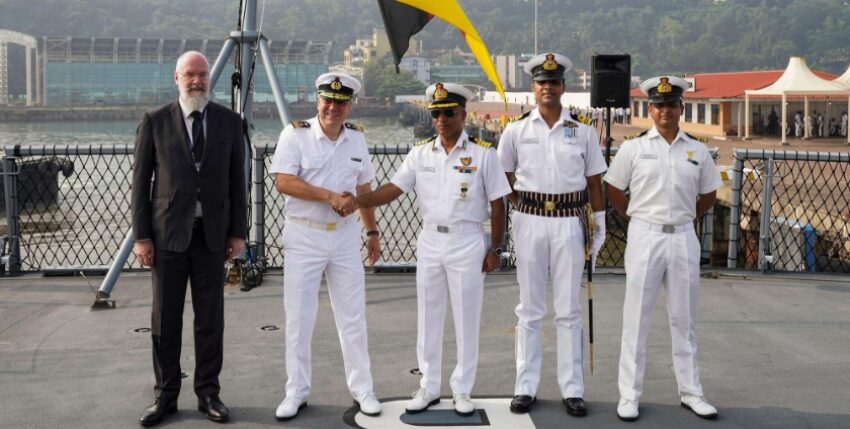Partnering - IPD 24 association exercises with Indian Navy
The Indo-Pacific Deployment 2024 (IPD 24) offered the German Navy a valuable opportunity to evaluate and further develop its operational capabilities and strategic approaches in a multinational environment. This initiative aimed to intensify cooperation with partners in the strategically important Indo-Pacific region, with a particular focus on strengthening relations with the Indian Navy.
The German frigate "Baden-Württemberg" and the task force provider "Frankfurt am Main" were at the centre of the manoeuvres, which lasted several days. Both ships fly the German flag in this region. On the Indian side, the destroyer INS "Delhi" (D61) from the Eastern Navy Command and the frigate INS "Tabar" (F44) from the Western Navy Command took part.
Intensive manoeuvres around India
A central component of the cooperation with the Indian Navy was the replenishment-at-sea exercises. These complex manoeuvres make it possible to supply ships on the high seas with fuel and solid supplies without having to call at a port, thereby increasing their endurance at sea. The exercises were carried out in what is known as a "dry hook", in which the ships manoeuvre in precise formation and the supply is merely simulated. All hose and line connections were made during the manoeuvres. Although no actual transfer of material took place, the navigation and technical coordination requirements posed a considerable challenge: The ships had to be steered closely and in parallel, and the nautical and manual manoeuvres on the manoeuvring decks had to be carried out correctly.
Another focal point was the watch officer drills for young officers on the bridge, also known as formation stationing drills. This is a good way to get to know the manoeuvring characteristics of one's own ship, but also to quickly reach a commanded station within the ship's formation tactically. The participating ships tested different formations that simulated both defensive and offensive scenarios. Good communication and close coordination were required in order to implement these manoeuvres smoothly. This experience provided the German Navy with a valuable opportunity to further develop its interoperability.
Another highlight of the manoeuvre was the so-called "CrossPol", during which crew members were exchanged between the ships. German crew members were able to spend time on the INS "Delhi", while Indian marines gained an insight into life and work on board the German ships. This exchange not only served the purpose of professional training, but also promoted cultural understanding and personal contact between the crews.
Special emphasis was placed on the air defence exercises (ADEX), which are essential for strengthening defence capabilities against air threats. German and Indian naval vessels worked together in realistic scenarios to fend off attacks from the air. This included recognising and repelling enemy aircraft. The exercise required precise use of the radar systems and defence weapons on board as well as coordinated deployment of various weapon systems and rapid response to threats from the air.
The joint manoeuvres as part of the Indo-Pacific Deployment 2024 were seen as beneficial by everyone involved. The exercise of tactical deployment procedures and the intensive exchange not only strengthened the operational capabilities of the respective crews, but also mutual trust and understanding and thus also the joint performance. The navies of the partner countries in the Indo-Pacific contribute to a common maritime picture and already contribute to the safety and freedom of navigation through their presence.
Partnering improves interoperability
Overall, IPD 24 highlighted the importance of international co-operation in the maritime domain. Through the intensive exchange of knowledge and capabilities, both navies were able to improve their operational readiness and at the same time cultivate valuable relationships that are important for future joint operations in the Indo-Pacific region. True to the German Navy's motto "Regionally routed - globally committed", the focus of maritime engagement within NATO remains on the northern flank, while at the same time engagement alongside its partner navies worldwide will be driven forward in the future.










